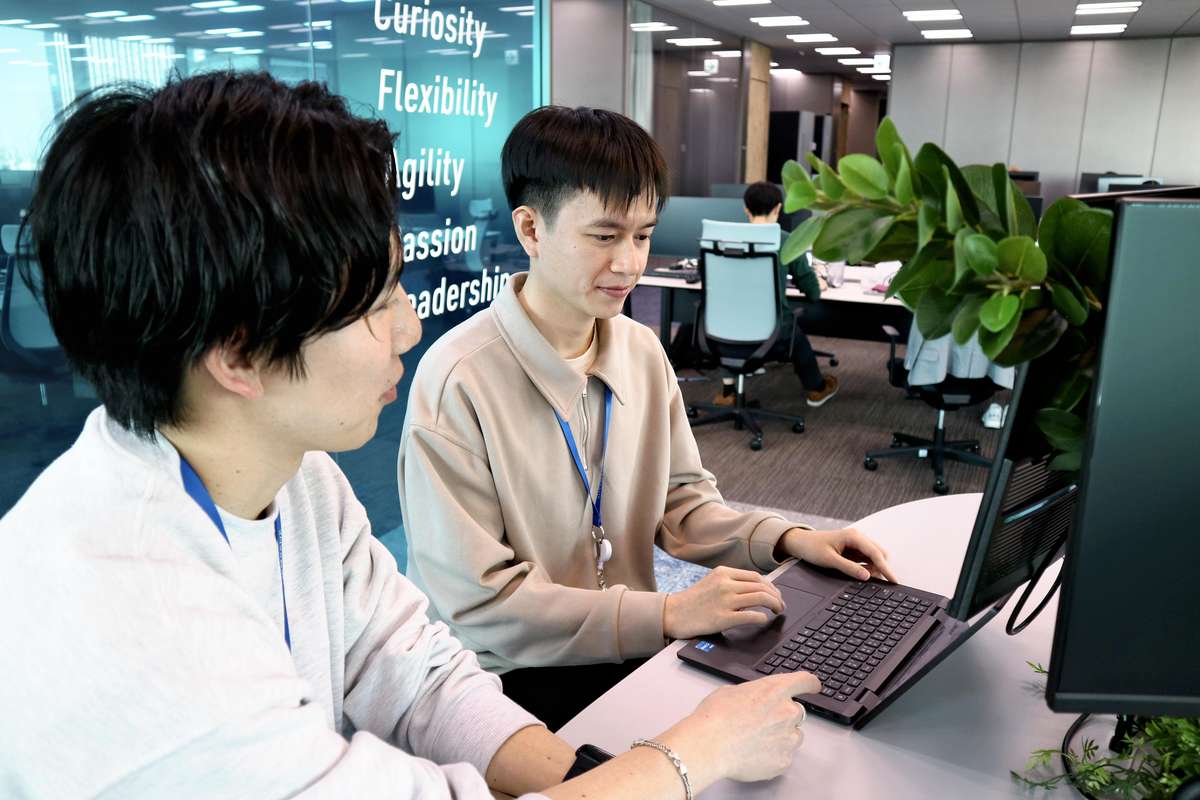
Yomiuri Shimbun file photo
Tran Hau Duc Thang, right, works in Minato Ward, Tokyo, in March.
14:08 JST, September 14, 2025
Japanese financial institutions aiming to strengthen their IT services are stepping up hiring Vietnamese engineers being trained under initiatives led by their government. With Japan’s shortage of engineers becoming increasingly serious, Vietnam has become the focus of a new source of IT talent, following India. Some companies are even offering Vietnamese recruits the same pay as their Japanese counterparts. However, with strong interest also coming from U.S. tech companies, competition for talent is expected to intensify.
Same conditions as Japanese staff
At the end of last year, SBI Sumishin Net Bank hired five Vietnamese workers, including 23-year-old Tran Hau Duc Thang. After graduating from the prestigious Hanoi University of Science and Technology, he immediately began working at the bank’s Tokyo headquarters, engaging in system development. “I want to play an active role in the field of data science,” he enthusiastically said.
In April, the bank raised its starting monthly salary for university graduates to ¥330,000 — the highest in the industry — and Vietnamese employees are paid the same amount. The bank plans to hire 10 Vietnamese employees next year and 15 the year after, equivalent to 30% of the company’s new graduates hires. “Rather than forcing ourselves to hire in Japan, the priority is to strengthen our development capacity by looking overseas,” executive officer Takeshi Sakai noted.
Sompo Japan Insurance Inc.’s IT subsidiary, Sompo Systems Inc., began recruiting from Vietnam in 2022. Two of the first group of hires started working in Japan last October with the same conditions as Japanese staff, and eight more will join by next year. The company covers the cost of Japanese language study in advance.
At Money Forward, Inc., a fintech firm developing accounting software, Vietnamese IT engineers have steadily increased since hiring began in 2017. Today, they make up about 35% of its more than 950 engineers.
Government-led training
Japan is expected to face a shortage of up to 790,000 IT workers by 2030. According to job site Doda, the ratio of IT job openings to applicants in July stood at 10.56 to 1, reflecting a persistent seller’s market and making it difficult to secure highly skilled personnel. Meanwhile, an executive at a major bank noted that “the quality of new IT graduates has declined,” prompting companies to seek immediate contributors abroad.
The Vietnamese government has set a goal of producing 1.5 million IT professionals by 2030, and many universities have established IT-related faculties. Influenced in part by anime, many students are studying Japanese, and the number of Vietnamese acquiring residency status in Japan is increasing. About 50 firms participated at a Japanese company job fair in Vietnam last year held by the Tokyo-based recruitment firm Sun Asterisk Inc. That number is 50% up from the previous year.
In India, competition for IT talent is already fierce, and Vietnam is seeing a similar trend as U.S. tech companies step up hiring with appealing conditions. The average monthly salary for Vietnamese IT engineers reached about $1,800 (¥260,000) in 2023, up 50% from 2018. Yuichiro Sato of Sun Asterisk noted, “The key will be how Japanese companies can prevail when competing with foreign firms in the future.”


AloJapan.com